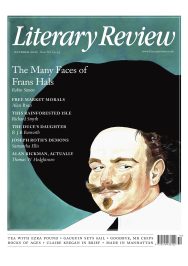Miranda Seymour
From Grand Duke to Dustbin Man
After the Romanovs: Russian Exiles in Paris Between the Wars
By Helen Rappaport
Scribe 317pp £20
Foreshadowing all the horrors of the October Revolution for tsarist Russians, as Helen Rappaport shows in this absorbing and poignantly topical account of life in exile, was the ‘dress rehearsal’ (Lenin’s description) of 1905, when the first uprising against the brutally oppressive Romanov regime was crushed in St Petersburg. The tsar retained his power, but the most prescient of the Romanovs knew that their days of splendour were numbered.
The events of 1905 loom behind the lively opening chapters of Rappaport’s admirably researched history of dispossessed White Russians – not just the surviving Romanovs – in Paris. ‘Alps crossed – Paris taken,’ the great Russian singer Feodor Chaliapin crowed to a friend in 1908 from a Paris which had shown itself more than ready to embrace Russian culture after watching Diaghilev’s artfully selected scenes from Boris Godunov. This was a buoyant prewar Paris in which visiting Russian princes showered appreciative dancers with orchids and diamonds, while their quietly apprehensive parents still presided over Proustian drawing rooms in palaces overlooking the Bois de Boulogne. Craftily – she’s a fine storyteller – Rappaport also introduces into the mix figures like Anna Akhmatova (enjoying a rapturous early love affair with Modigliani), Chagall, eager to meet Diaghilev’s great designer Léon Bakst, destitute Chaïm Soutine, painting carcases and living on scraps, and Paris-hating Lenin himself, seen through the eyes of an admiring young poet, Ilya Ehrenburg, newly arrived from Lithuania.
And then came 1917. ‘I shall forever go on looking, seeing my own land slip softly, slowly away from me,’ the popular Russian author known as Teffi wrote. Rappaport tracks the terrible exodus from Odessa to Constantinople, the city reached in 1920 by a ‘veritable armada’ of boats

Sign Up to our newsletter
Receive free articles, highlights from the archive, news, details of prizes, and much more.@Lit_Review
Follow Literary Review on Twitter
Twitter Feed
It wasn’t until 1825 that Pepys’s diary became available for the first time. How it was eventually decrypted and published is a story of subterfuge and duplicity.
Kate Loveman tells the tale.
Kate Loveman - Publishing Pepys
Kate Loveman: Publishing Pepys
literaryreview.co.uk
Arthur Christopher Benson was a pillar of the Edwardian establishment. He was supremely well connected. As his newly published diaries reveal, he was also riotously indiscreet.
Piers Brendon compares Benson’s journals to others from the 20th century.
Piers Brendon - Land of Dopes & Tories
Piers Brendon: Land of Dopes & Tories - The Benson Diaries: Selections from the Diary of Arthur Christopher Benson by Eamon Duffy & Ronald Hyam (edd)
literaryreview.co.uk
Of the siblings Gwen and Augustus John, it is Augustus who has commanded most attention from collectors and connoisseurs.
Was he really the finer artist, asks Tanya Harrod, or is it time Gwen emerged from her brother’s shadow?
Tanya Harrod - Cut from the Same Canvas
Tanya Harrod: Cut from the Same Canvas - Artists, Siblings, Visionaries: The Lives and Loves of Gwen and Augustus John by Judith Mackrell
literaryreview.co.uk